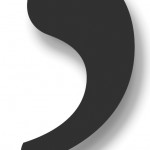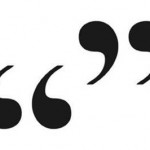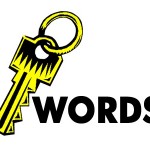
by cjxpadmin | Sep 1, 2012 | Job Readiness, September 2012 Magazine
By Yolanda L Salazar
I hope you had time to take the small test we provided in Job Club Discussion #7, Punctuation on August 29, 2012. The comments were varied. Some felt it was rather easy and they felt good that they had done pretty well. Others indicated that it was more difficult than the previous week with the Grammar questions. Hmm…
Regardless, I have provided for you the questions as they were asked in the discussion and then a corrected version beneath it. After that is a brief description of each punctuation mark, its uses and examples. Please continue to test yourself from time to time. You will be amazed how you can still remember some of the rules we learned in grade school.
Check out your answers below and see how you did. Did you do well? I hope so.
PERIOD.
1. Chloe tried to buy the $9.99 CD at the store on Memphis St but someone had only given her 9.45 INCORRECT
Corrected: Chloe tried to buy the $9.99 CD at the store on Memphis St., but someone had only given her $9.45.
2. Nine-tenths, .9, is written out as .09. INCORRECT
Corrected: Nine-tenths is written out as .9.
The period is used in varied ways. A period is used to indicate the ending of a sentence.
The secretary is a vital part of the office.
It ‘s also used in abbreviations to show a short form of a word.
Street = St., Collins St.
It’s used in dollar amounts to separate dollars from cents.
Ten Dollars and Fifty-five cents – $10.55
And it’s used in decimals to designate portions of whole numbers. Nine-tenths = .9
COMMA.
3. Alec, brother to Baby Joshua, has the best toys in the playroom. CORRECT
4. Margie began her new employment on Wednesday October 1 2012.
Corrected: Margie began her new employment on Wednesday, October 1, 2012.
The comma has many, many uses. Here are just a few. It is used to separate independent sentences joined by a conjunction.
The phone was ringing, but Carolyn wasn’t in her office.
Used after a dependent clause before an independent sentence.
Before Beth left the office, she called for a cab.
Another use is to describe a noun or the subject of your sentence.
Sharon, the secretary next door, offered to cover the office in Brenda’s absence.
A comma also separates names, phrases or clauses.
Dora, Phillip, Deborah, and the Legal Division celebrated Marvin’s promotion.
You also use a comma to separate two adjectives in describing the same noun that might be misunderstood.
Henry has a loyal, dedicated secretary.
Commas can set off items in dates, addresses and cities.
Don began his employment on June 1,1987. He came from Chicago, Illinois.
It is also used to separate names from titles as well as after salutations in a letter to a friend.
John Brandon, Executive Director or… Dear Louise,
A comma is required after a complimentary closing in a letter.
Sincerely yours,
To set off a direct quotation, a comma is needed as well as indicating the omission of words.
Betty said, “We open at nine o’clock, not ten o’clock.”
COLON :
5. The classroom consisted of four things, desks, chairs, computers and books. INCORRECT
Corrected: The classroom consisted of four things: desks, chairs, computers and books.
6. We had to cancel our trip: Rachel and her sister were sick. CORRECT
The colon is used to offset a series of items.
Four things are needed to make an office: a desk, a file cabinet, a telephone and a typewriter.
SEMICOLON ;
7. Melvin was very upset; the question for Job Club was not ready. CORRECT
8. Andrea answered the question correctly, therefore, she received the prize. INCORRECT
Corrected: Andrea answered the question correctly, therefore, she received the prize.
A semicolon is used to separate independent clauses joined by conjunctive adverbs.
Charles in Personnel did the best work; therefore, he got the raise.
It is also used to separate independent sentences that are closely related and at the same time sentences or phrases that make contrasting statements.
Bridget was ready; she wanted to begin her interview. or…
Love is forgiving; hate, vengeful.
APOSTROPHE 
9. We wanted to use Sheenas’ computer, but its security code was missing. INCORRECT
Corrected: We wanted to use Sheena’s computer, but its security code was missing.
10. Back in the 50s, we used to see a lot of Rock and Roll. INCORRECT
Corrected: Back in the 50’s, we used to see a lot of Rock and Roll.
The apostrophe shows possession of nouns and some pronouns.
Everyone in the office used Mae’s typewriter, but it was not anyone’s fault that it finally broke.
It is also used to indicate the omission of figures in such things as dates or the omission of letters in words that form contractions.
Teresa was in the Class of ’68, but she didn’t wish to come to the Reunion.
And, an apostrophe can form plurals of letters, symbols and figures.
Anita received all A’s in primary school back in the ’50’s and she would always mind her p’s and q’s.
DASH – —
11. The office crew decided to send 1-2 displays for the conference. CORRECT
12. James and Louise the two top sales persons received awards. INCORRECT
Corrected: James and Louise — the two top sales persons — received awards.
There are three types of dashes which are more commonly used. The en dash (-) is used between numbers, dates and places to designate extent or duration.
en –
The section on Filing is between Pages 45-53. or…
The office hours are between 9-5.
The em dash (—) has several more uses than the en dash. One of these is to show a break or change in thought in a sentence.
em —
The supervisor picked up — and no one bothered to stop him — the broken drawer of files.
Another use of the em dash is before and after material that is used to clarify or show emphasis.
The male and female employees of the month — Ray and Agnes — were presented with awards.
One other use of this type of dash is before a statement that summarizes the content of the sentence.
Name, height, weight and social security number — these items are required on your 1.D. card.
The last use of the em dash that I am going to tell you about is when you use it before the name of an author at the end of a quotation.
To be or not to be — Shakespeare
The last type of dash is two-em (- -) which is used to indicate the omission of a word or numbers or letters in a word.
2 em – –
Dear Mrs. —
QUESTION MARK
13. May we please take your jacket. INCORRECT
Corrected: May we please take your jacket?
14. Your jacket was left where? CORRECT
The question mark ends a sentence posing an inquiry.
May we deliver your supplies before nine o’clock?
A second form of using the question mark is when uncertainty or doubt is expressed and you show it in parenthesis.
Mr. Quintin’s secretary said he would be back in his office around three (?) o’clock.
EXCLAMATION POINT !
15. Hurry, the sale is on. INCORRECT
Corrected: Hurry! The sale is on.
16. Stop! Your purse is on top of your car. CORRECT
The exclamation point is used to indicate surprise or stress strong emotion.
“Hurry!” Penny said, “The fire alarm has been activated!”
PARENTHESIS
17. The child will (one day) learn his own schedule. CORRECT
18. The report is due within ten, 10, days.
Corrected: The report is due within ten (10) days.
Parenthesis are used to set off descriptive phrases which are not required in a sentence.
The staff meeting broke up about four o’clock (a little longer than they had hoped it would last).
Parenthesis can also be used to set off series of numbers or letters used for listing purposes.
The staff meeting consisted of two individuals from each of the following programs: (a) Personnel (b) Legal, (c) Business Management, and (d) Administration. or…
The shelves available through the office supply store are: (1) two-tiered and (2) horizontal/vertical.
Quotation Marks 
19. “Sarah, asked Stacy, do you really want to use the software?”
Corrected: “Sarah,” asked Stacy, “do you really want to use the software?”
20. Yolanda “Yoli” went to the party with the group. CORRECT
The most important use of quotation marks is to enclose a direct quote.
“Jennifer,” asked Mr. Hall, “what time did you say Colonel Rector would be here for his appointment?”
Quotation marks are also used to enclose such things as chapters in a book, lectures, titles, movies, programs, and songs.
In reading the article “My Boss,” Keisha thought about the movie “9 to 5.”
One last use of quotation marks is to enclose slang expressions, nicknames or just ordinary words.
He was a “bum.” or…
Elizabeth “Liz” Thorne was invited to the class party.
That’s my article on Punctuation. Hope it was helpful. In closing, you are being given the Punctuation Tree, for future use, if you please.
Just click on the chart. I couldn’t get the tree to work; however, the chart works just fine.
Upon clicking a punctuation mark on the chart, you will be taken to a full page of rules and instructions on how to use that particular mark. And the best thing is that somewhere beneath all of this, is a section where you can take tests, just for fun!! Be careful! These are not easy. They are college level. Good Luck! △
by cjxpadmin | Aug 28, 2012 | Job Club Heart of Texas, Job Search
Punctuation, what is it good for? Absolutely everything!
This is true; punctuation is important in many situations, especially when the situation is your employment. Intelligence is a necessary tool at every place of business and knowing how to use punctuation/grammar correctly is a sure sign of this. For those who have not received a formal education, good grammar and knowledge of correct punctuation can be perceived as such. Many have made the point that their supervisors make grammatical errors daily. Grammar does not guarantee you a position, but using it properly can enhance your chances of a better paying position within the company or possibility for advancement.
In September, we will be having another Showcase Event, possibly two. These events will have a certain type of industry concentration, Retail and Sales. Grammar is of huge importance in these fields. Sales is all about the way you speak and present yourself, your company, and your product. This is why we want you to be prepared in every way when we place you in front of an employer for an interview. The more confident you are in the way you present yourself, the more confident the employer will be when hiring you to do the job.
On September 1st, two full-length, in-depth articles will be posted with regard to Grammar and Punctuation. Punctuation has shown to be tough for many, as well as Grammar. So, today, we want to know “What part of punctuation stumps you the most?”
As observed from last week’s Grammar Income Test, it appears that many of the questions that were answered incorrectly had to do with punctuation. We have created another small test for you to complete to allow you to practice your punctuation rules. In addition to correcting the punctuation, also be mindful of anything that is missing.
As before, mark your answers as Correct or Incorrect. In instances where you see a multiple choice answer, write down the letter for that. Okay, here we go:
Period.
- Chloe tried to buy the $9.99 CD at the store on Memphis St but someone had given her only 9.45
- Nine-tenths is written out as: (a) .09 (b) 9 (c) .9 (d) .90
Comma.
- Alec, brother to Baby Joshua, has the best toys in the playroom.
- Margie began her new employment on Wednesday October 1 2012.
Colon:
- The classroom consisted of four things, desks, chairs, computers and books.
- We had to cancel our trip: Rachel and her sister were sick.
Semicolon
- Melvin was very upset; the question for Job Club was not ready.
- Andrea answered the question correctly, therefore, she received the prize.
Apostrophe
- We wanted to use Sheenas’ computer, but its security code was missing.
- Back in the 50s, we used to see a lot of Rock and Roll.
Dash
- The office crew decided to send 1-2 displays for the conference.
- James and Louise the two top sales persons received awards.
Question Mark
- May we please take your jacket.
- Your jacket was left where?
Exclamation Point
- Hurry, the sale is on.
- Stop! Your purse is on top of your car.
Parenthesis
17. The child will (one day) learn his own schedule.
18. The report is due within, 10, ten days.
Quotation Marks
19. “Sarah, asked Stacy, do you really want to use the software?”
20. Yolanda “Yoli” went to the party with the group.
To review your answers, please refer to the article in the upcoming September Issue entitled “Punctuation.” There you will not only see the answers as well as a few tips with regard to punctuation. Good Luck! And as always, thanks for participating.
If anyone is interested in Retail and Customer Service positions, please email rachel@campusjobxpress.com. We are having a Job Event the last part of September.

by cjxpadmin | Aug 27, 2012 | September 2012 Magazine, This Issue's FEATURE
by Sheena Williams
You Have A Question. You have a burning desire to get information. Happenstance has caused you to require the answer and
 by gosh, you are going to get it! Swell, you turn to the library and then you turn to the internet, and your search has yielded nothing. Not a single thing. You are no closer to reaching your goal for researching than you were when you first started needing this information. Well, don’t worry! We are going to outline a few things that might help you on your way to gaining the knowledge that you need!
by gosh, you are going to get it! Swell, you turn to the library and then you turn to the internet, and your search has yielded nothing. Not a single thing. You are no closer to reaching your goal for researching than you were when you first started needing this information. Well, don’t worry! We are going to outline a few things that might help you on your way to gaining the knowledge that you need!
Keywords. Let’s say that your question is something like “What is paper made of?” Well, of course  you’re going to turn up literally thousands of answers by just googling. But what if you wanted to find out about how a certain type of paper was made? This particular paper is made from the parchment of some exotic tree on the banks of the Nile. Farfetched when you could just google the paper, but when you don’t have anything else to go on than a location and the type of item, it makes for hard research. This is where keywords come in. You can go to any library or web browser and start searching for the words: paper, Nile, parchment, tree. The keywords not only narrow your search, but it will give the browser or book log — something to grab onto when searching. By narrowing the results down or separating them into parts, you come up with a whole that will lead you to the answer.
you’re going to turn up literally thousands of answers by just googling. But what if you wanted to find out about how a certain type of paper was made? This particular paper is made from the parchment of some exotic tree on the banks of the Nile. Farfetched when you could just google the paper, but when you don’t have anything else to go on than a location and the type of item, it makes for hard research. This is where keywords come in. You can go to any library or web browser and start searching for the words: paper, Nile, parchment, tree. The keywords not only narrow your search, but it will give the browser or book log — something to grab onto when searching. By narrowing the results down or separating them into parts, you come up with a whole that will lead you to the answer.
Phrases. Much like keywords, phrases will help you search for exact items dealing with the subject you are trying to get information on. You are searching for a book and you don’t know the title, the author or where the book can be found. You are  looking for a song and you are unable to remember the song lyrics or you don’t know the name of the song. By searching for the whole phrase, you are giving instructions for the computer or library database to look for a string of words that are in sequence. It narrows the amount of searching that has to be done because of the very specific information you entered in the search engine.
looking for a song and you are unable to remember the song lyrics or you don’t know the name of the song. By searching for the whole phrase, you are giving instructions for the computer or library database to look for a string of words that are in sequence. It narrows the amount of searching that has to be done because of the very specific information you entered in the search engine.
Spelling. Spelling what you are looking for properly cannot be impressed upon enough. By spelling the name of what you are speaking of properly, you can find whatever you are looking for much faster.  Unfortunately, in our world of creative ways of doing things, what you may think is the proper spelling of a word may not be the proper spelling of what you are looking for. If you are looking for a packaging and all you have is the word lid, the company may, in fact, have lids. They may, in fact, even be called Lids. But what you don’t know is that Lids is spelled Lydz. What you didn’t know is that the name of the item is a play on the spelling, and also the name of the owner, Lydia. The world of printing is not subject to the same laws as the rest of the literary world.
Unfortunately, in our world of creative ways of doing things, what you may think is the proper spelling of a word may not be the proper spelling of what you are looking for. If you are looking for a packaging and all you have is the word lid, the company may, in fact, have lids. They may, in fact, even be called Lids. But what you don’t know is that Lids is spelled Lydz. What you didn’t know is that the name of the item is a play on the spelling, and also the name of the owner, Lydia. The world of printing is not subject to the same laws as the rest of the literary world.
Ask Friends. When you hit a road block with your search, bounce some ideas off your friends! They may not only already know exactly where to look and give you suggestions, they may also know of another way of looking for something. They may have a phrase or some keywords you haven’t even thought or imagined. They may know more of that song you were searching earlier. They may know the address of that packing company. They may know that the business you are looking for is spelled a little differently. Your friends and family are a fount of information that you may not have tapped into who can get you that answer that much faster!
Frustration. Don’t, under any circumstances, get frustrated with your search. There is a lot of information out there which means there’s a lot of information you’ll have to weed through. There will be times when you will find everything around the subject, but not the exact subject you are seeking. There will be times when you see the exact title of what you want, but due to mislabeling, you turn up a site about the rain forest. That’s all well and dandy, but you were looking for information about card board boxes. Know that when you start the search that you may not come up with much the first time around. In fact, you may have the opposite and have too much information thrown at you with not only different pages, but different opinions. Just take a deep breath and wade through. You will find your targeted item or song or company.
Remember, with a little elbow grease and a few of the suggestions listed above, you will be able to find anything you desire on the internet or anywhere! △

by cjxpadmin | Aug 27, 2012 | Job Search, September 2012 Magazine
by Marrisa Maldonado
The role of a manager and the role of a leader are often thought to go hand in hand. Many individuals think that in order to be a manager, you have to be a leader and vice versa, but the fact of the matter is that both positions have differences in their functionalities and in their duties. All managers have formal authority and status. Three main roles that managers assume are informal roles, interpersonal roles, and decisional roles.
The informal role of a manager concerns how they receive and relay information and how they monitor internal and external information.
Interpersonal aspects of their work include establishment and maintenance of interpersonal relations. Another aspect  of their interpersonal duties is to be a figurehead and a liaison for subordinates in a symbolic manner.
of their interpersonal duties is to be a figurehead and a liaison for subordinates in a symbolic manner.
A manager’s decisional duty includes entrepreneurship. They handle problems by turning them into opportunities, and they have to be negotiators and resource allocators.
The five major functions that managers perform are planning, organizing, command, coordinating, and control.
 When it comes to planning, a manager has to determine an organization’s goals and think of logistics and resources.
When it comes to planning, a manager has to determine an organization’s goals and think of logistics and resources.
Organizing/coordinating means that managers have to adapt and know how to integrate activities and tasks.
Command is based on a leadership function which means that it is the manager’s responsibility to direct and coordinate people and to motivate their employees.
Last but not least is the controlling function which entails monitoring the performance of their employees, correcting, implementing and reinforcing disciplinary actions, as well as keeping the organization on track.
If you are applying to a managerial position, you need to keep the responsibilities and roles that were previously listed in your mind and not take them lightly. Most people believe that if they can lead, then, that makes them a good manager, but this is not the case. The nature of managerial work is supposed to be used as a tool for the organization. Organizations are social interventions and are designed to accomplish tasks through group efforts. Managers are critical tools because managers should be able to understand and predict the behavior of people within organizations.
Basically, if you think that being a manager means separating yourself from your subordinates and interacting with them  only when you need to communicate orders, you are in for a rude awakening. I would strongly recommend that you have strong communication skills and be proficient in emotional sensitivity if your goal is to take on managerial responsibilities. When you become a manager, your popularity level will change among your co-workers. If you are a people pleaser by nature, then, I would not recommend a managerial position for you because you cannot please everyone. Part of being a manager is making tough decisions that your employees may not agree with or like. People who want and like positive feedback in exchange for their hard work should not seek out a managerial position because most of the time, no one pats you on the back and gives you positive feedback for your work when you are a manager. If you have been promoted to a managerial position or are seeking employment in this position, keep in mind that the best managers only strive to receive respect from their employees. You should always want respect from others at your job and not be too concerned with employees liking you. Remember that “respect” and “like” are two different things in any aspect of life.
only when you need to communicate orders, you are in for a rude awakening. I would strongly recommend that you have strong communication skills and be proficient in emotional sensitivity if your goal is to take on managerial responsibilities. When you become a manager, your popularity level will change among your co-workers. If you are a people pleaser by nature, then, I would not recommend a managerial position for you because you cannot please everyone. Part of being a manager is making tough decisions that your employees may not agree with or like. People who want and like positive feedback in exchange for their hard work should not seek out a managerial position because most of the time, no one pats you on the back and gives you positive feedback for your work when you are a manager. If you have been promoted to a managerial position or are seeking employment in this position, keep in mind that the best managers only strive to receive respect from their employees. You should always want respect from others at your job and not be too concerned with employees liking you. Remember that “respect” and “like” are two different things in any aspect of life.
For those of you who are applying for jobs, but are not seeking managerial positions, I have not forgotten about you. Even though you are not seeking a managerial position, you have to be conscious of what type of manager is hiring you or what type of manager you are currently working for.
Managers hold two assumptions about the nature of their employees. A Theory X manager views employees as irresponsible and lazy. These managers assume that people dislike work and will do what is possible to avoid it. They believe that employees must be coerced, threatened, or punished for them to achieve goals.
Theory Y managers hold the assumption that people are responsible and employees are generally ambitious about their work. They also believe that people have self-direction toward completing tasks and goals. Which manager would you prefer? I do not know about the rest of you, but I think that Theory Y manager is the better candidate.
Now for those of you who strive to be leaders in the work place, I commend you for your goal, but I will explain what functions a leader has and you can decide if this is for you or not. For those of you who already identify yourselves as leaders, you can decide what type of leader you are because I will discuss two types of leadership styles as well.
Leaders are individuals who facilitate a movement by a group of people toward a common goal. Leadership is a process of influence. It is important for you to remember that not all managers exercise leadership! I cannot stress that point enough. Leadership is about coping with change and establishing direction. Leaders know how to motivate people by inspiring them to overcome obstacles. In order for an organization to be effective, it needs to have strong leadership and management, but in America, there is under leading and over managing. There are a lot of leaders that have no formal authority within the workplace and there is nothing wrong with that. You tend to see this type of leadership the most in the work place. In general, most leaders have common characteristics from others which are more ambition, energy, desire to lead, self-confidence, high intelligence, and are high self-motivators. If you fit these characteristics, then, you have the makings of a leader! If you do not have any formal authority at your job, that does not mean that you cannot be a leader. In fact, I would advise you to be a leader even if you are not the boss because we need more leaders.
Now to be clear, I am not saying to overpower or undermine your boss or manager. All I am saying is to be a leader, if you want to be and let your manager do their duties, you must delegate. In the U.S., most people are transactional leaders. These leaders base their interactions by straightforward exchanges between them and their followers. If their followers perform well, the leader will reward them. The main goal of this type of leader is to keep the behavior of their followers in line with the organization’s goals.
The other type of leader is the transformational leader which is the type of leader who uses vision to instill commitment in their followers. This type of leader will make changes to an organization in order to change beliefs and attitudes of their followers. One type of leader is not better than the other. It all depends on the followers and the needs of those followers. If you are a follower, it is your personal needs that will drive you to decide which type of leader you will follow. Being a follower is not a bad thing at all because people who are leaders cannot lead if they have no followers. Leaders are not meant to be seen as individuals who can do it all, they need followers to help them carry through with their leadership. Everyone has a purpose and a part to play.
Now that you know the differences between a manager and a leader, you can decide which one you would prefer to be. Do you think it is better in the long run to be a manager or a leader? Do you think that one person can be both a manager and leader at the same time? Is your job or the one you are applying to being directed by a leader or a manager? Think about it. △

![]()
![]()














